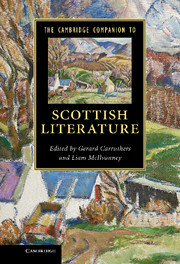Book contents
- Frontmatter
- Contents
- Notes on Contributors
- Acknowledgements
- Chronology
- Introduction
- 1 Scottish Literature before Scottish Literature
- 2 The Medieval Period
- 3 Reformation and Renaissance
- 4 The Aftermath of Union
- 5 Robert Burns
- 6 Enlightenment, Romanticism and the Scottish Canon
- 7 Scott and the Historical Novel
- 8 The Gaelic Tradition
- 9 Scottish Gothic
- 10 Victorian Scottish Literature
- 11 Robert Louis Stevenson
- 12 Hugh MacDiarmid and the Scottish Renaissance
- 13 Popular Fiction
- 14 Muriel Spark
- 15 The Glasgow Novel
- 16 ‘What is the language using us for?’
- 17 The Emergence of Scottish Studies
- 18 Otherworlds
- 19 Scottish Literature in Diaspora
- Index
- References
15 - The Glasgow Novel
Published online by Cambridge University Press: 05 January 2013
- Frontmatter
- Contents
- Notes on Contributors
- Acknowledgements
- Chronology
- Introduction
- 1 Scottish Literature before Scottish Literature
- 2 The Medieval Period
- 3 Reformation and Renaissance
- 4 The Aftermath of Union
- 5 Robert Burns
- 6 Enlightenment, Romanticism and the Scottish Canon
- 7 Scott and the Historical Novel
- 8 The Gaelic Tradition
- 9 Scottish Gothic
- 10 Victorian Scottish Literature
- 11 Robert Louis Stevenson
- 12 Hugh MacDiarmid and the Scottish Renaissance
- 13 Popular Fiction
- 14 Muriel Spark
- 15 The Glasgow Novel
- 16 ‘What is the language using us for?’
- 17 The Emergence of Scottish Studies
- 18 Otherworlds
- 19 Scottish Literature in Diaspora
- Index
- References
Summary
In his landmark 1935 travelogue, Scottish Journey, the poet Edwin Muir finds himself daunted and perplexed by the tremendous fact of Glasgow. On the one hand, Glasgow’s significance and scale are indisputable: the forces of industrialism that are transforming the country are most rampantly evident in the city on the Clyde, and a ‘description of Scotland which did not put Glasgow in the centre of the picture would not be a description of Scotland at all’. On the other hand, Muir frets that Glasgow is un-Scottish, being shaped more by the homogenising, transnational processes of ‘Industrialism’ than by the customary folkways of the nation:
In one way it may be said that this area is modern Scotland, since it is the most active and vital part of Scotland as well as the most populous … But from another point of view one may say that it is not Scotland at all, or not Scotland in particular, since it is merely one of the expressions of Industrialism, and Industrialism operates by laws which do not recognize nationality.
Should Glasgow engross or escape Muir’s attention? Muir seems not to know, and his ambivalence reflects a sense of Glasgow as sui generis in the context of Scotland. Glasgow’s economic take-off, rooted in the eighteenth-century tobacco and sugar trades, and its transformation by heavy industry in the Victorian era, made it a monstrous anomaly: by 1901 nearly half of Scotland’s four and a half million people lived in the Clydeside conurbation. Glasgow was a city with its face turned westward to America, and perhaps also to Ireland, rather than to the hinterland behind it. And it was a city with a raft of intractable social problems – slum housing and overcrowding being the most pernicious – of a scale and intensity unparalleled in the rest of the country. Glasgow was indeed a place apart.
- Type
- Chapter
- Information
- The Cambridge Companion to Scottish Literature , pp. 217 - 232Publisher: Cambridge University PressPrint publication year: 2012
References
- 3
- Cited by

